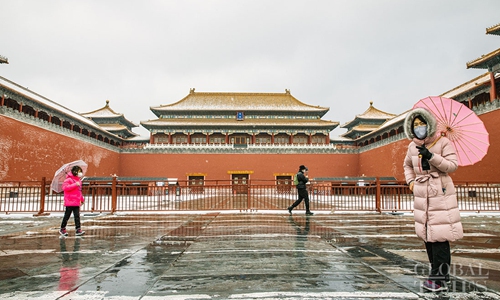HOME >> CHINA,SPECIAL-COVERAGE
Beijing intensifies battle to clear epidemic of novel coronavirus
By Yang Sheng and Wan Lin Source:Global Times Published: 2020/2/15 14:11:20

Photo: Li Hao/GT
The Beijing government has ordered all grade-II and III hospitals to cancel non-emergency onsite registration and replace it with apps, hotlines or online appointments.
The measures aim to reduce crowds and infections at hospitals, said Gao Xiaojun, a government spokesperson at a press conference on the control of novel coronavirus pneumonia in Beijing on Sunday.
Grade-III hospitals must start using the online appointment system by Thursday and grade-II hospitals by February 25, according to the regulation.
The city government convened a meeting on Friday to discuss the implementation of even stricter epidemiological investigation over "close contacts" of the suspected and confirmed patients of the novel coronavirus pneumonia, or COVID-19, to ensure "zero infection".
To hold back the virus, Beijing city enacted a law on Friday that all people coming to Beijing must be quarantined for 14 days on their own. Violators will be punished by law.
The municipal government's leading group of the COVID-19 prevention and control work said that the capital city will enforce stricter regulations and coordinate the prevention work to defend Beijing from the virus. The conference stressed all hospitals in Beijing should accelerate the progress of hospitalization of the patients and try their best to diagnose suspected cases to treat the infected patients at the earliest.
For the work of epidemiological investigation, the conference vowed the relevant governmental agencies will strictly expand the investigation scope to cover more "close contacts" of the patients. The conference emphasized the use of a combination of traditional Chinese and western medicine to facilitate the medical treatment of the patients and reduce mortality rate.
"With a large influx of migrant workers to the capital city recently, I believe it's appropriate for the city to take stringent measures in epidemic control under such conditions," Yang Gonghuan, a former vice-director of the Chinese Center for Disease Control and Prevention, told the Global Times on Saturday.
She said the novel coronavirus transmissibility was underestimated in the beginning, which is highly contagious and spreads easily with the flow of people. Besides the World Health Organization reminded China that it's not the time to celebrate yet, although the number of new infectious cases in other provinces than Hubei is on a decline for 11 consecutive days.
Strengthening measures to investigate more people don't necessarily mean the situation is worsening or there is any significant confidential threat concealed from the public, as the data about the confirmed or suspected new infections are constantly declining, said a Beijing-based expert on epidemic prevention and control, on conditions of anonymity.
But it is too early to ease, and according to former experience of epidemic prevention, because the current situation is improving, he warned.
It is also the crucial period for the government to strengthen measures to consolidate the ongoing positive trend and seal the loopholes for any potential threat that might revive the dangers, as some residents might relax vigilance, he noted.
The conference stressed hospital presidents' responsibilities in screening the potential infections from the available details with an efficient approach.
In regards to the influx of migrant workers returning to Beijing, the conference also mandated companies and agencies in Beijing to implement stringent measures to achieve zero infection. In the meantime, ambient sanitization and safety code should be reinforced in public places and vehicles.
Disease control centers of all levels have been instructed to stay in a "war-time mind," and beef up care of community workers in the frontier of epidemic control while reinforcing heightened supervision on them.
Global Times
Posted in: SOCIETY,FOCUS